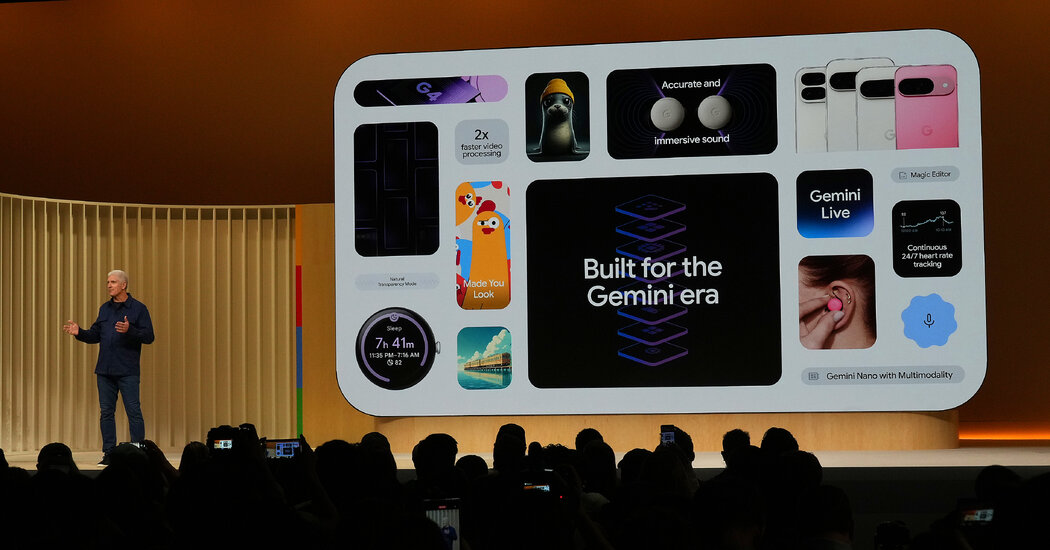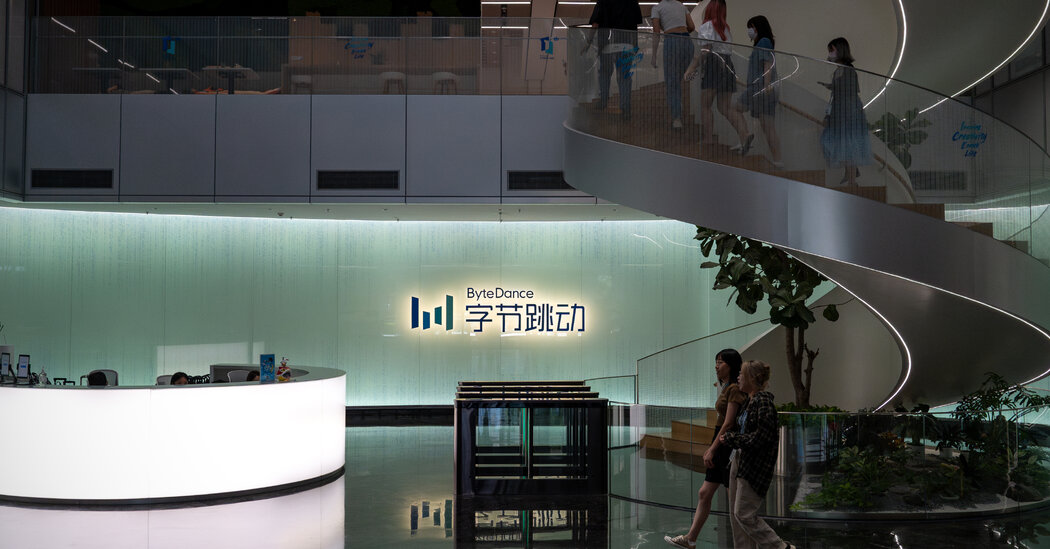The founders of Blng say their technology needs just seconds to turn ideas into images suitable for clients or manufacturers.
Source link
برچسب: A.I
-
A New App Uses A.I. to Speed Jewelry Design
-

Google Plans to Roll Out Gemini A.I. Chatbot to Children Under 13
Google plans to roll out its Gemini artificial intelligence chatbot next week for children under 13 who have parent-managed Google accounts, as tech companies vie to attract young users with A.I. products.
“Gemini Apps will soon be available for your child,” the company said in an email this week to the parent of an 8-year-old. “That means your child will be able to use Gemini” to ask questions, get homework help and make up stories.
The chatbot will be available to children whose parents use Family Link, a Google service that enables families to set up Gmail and opt into services like YouTube for their child. To sign up for a child account, parents provide the tech company with personal data like their child’s name and birth date.
Gemini has specific guardrails for younger users to hinder the chatbot from producing certain unsafe content, said Karl Ryan, a Google spokesman. When a child with a Family Link account uses Gemini, he added, the company will not use that data to train its A.I.
Introducing Gemini for children could accelerate the use of chatbots among a vulnerable population as schools, colleges, companies and others grapple with the effects of popular generative A.I. technologies. Trained on huge amounts of data, these systems can produce humanlike text and realistic-looking images and videos.
Google and other A.I. chatbot developers are locked in a fierce competition to capture young users. President Trump recently urged schools to adopt the tools for teaching and learning. Millions of teenagers are already using chatbots as study aids, writing coaches and virtual companions. Children’s groups warn the chatbots could pose serious risks to child safety. The bots also sometimes make stuff up.
UNICEF, the United Nation’s children’s agency, and other children’s groups have noted that the A.I. systems could confuse, misinform and manipulate young children who may have difficulty understanding that the chatbots are not human.
“Generative A.I. has produced dangerous content,” UNICEF’s global research office said in a post on A.I. risks and opportunities for children.
Google acknowledged some risks in its email to families this week, alerting parents that “Gemini can make mistakes” and suggesting they “help your child think critically” about the chatbot.
The email also recommended parents teach their child how to fact-check Gemini’s answers. And the company suggested parents remind their child that “Gemini isn’t human” and “not to enter sensitive or personal info in Gemini.”
Despite the company’s efforts to filter inappropriate material, the email added, children “may encounter content you don’t want them to see.”
A Google email to parents this week warned about the risks of Gemini for children. Over the years, tech giants have developed a variety of products, features and safeguards for teens and children. In 2015, Google introduced YouTube Kids, a stand-alone video app for children that is popular among families with toddlers.
Other efforts to attract children online have prompted concerns from government officials and children’s advocates. In 2021, Meta halted plans to introduce an Instagram Kids service — a version of its Instagram app intended for those under the age of 13 — after the attorneys general of several dozen states sent a letter to the company saying the firm had “historically failed to protect the welfare of children on its platforms.”
Some prominent tech companies — including Google, Amazon and Microsoft — have also paid multimillion-dollar fines to settle government complaints that they violated the Children’s Online Privacy Protection Act. That federal law requires online services aimed at children to obtain a parent’s permission before collecting personal information, like a home address or a selfie, from a child under 13.
Under the Gemini rollout, children with family-managed Google accounts would initially be able to access the chatbot on their own. But the company said it would alert parents and that parents could then manage their child’s chatbot settings, “including turning access off.”
“Your child will be able to access Gemini Apps soon,” the company’s email to parents said. “We’ll also let you know when your child accesses Gemini for the first time.”
Mr. Ryan, the Google spokesman, said the approach to providing Gemini for young users complied with the federal children’s online privacy law.
-

How TikTok’s Parent, ByteDance, Became an A.I. Powerhouse
The Chinese internet giant ByteDance has made some of the world’s most popular apps: TikTok and, in China, Douyin and Toutiao.
In the United States, TikTok claims 170 million users. But in China, about 700 million use the domestic version, Douyin, and 300 million scroll the headlines on Toutiao, a news app. Every video that ByteDance’s users watch or post gives the company another data point about how people use the internet. For years, ByteDance has applied that wealth of information to make its apps more appealing, improving its ability to recommend content to keep users hooked.
ByteDance is also using the data as the linchpin of a growing business in artificial intelligence. The company has invested billions of dollars in the infrastructure needed to power A.I. systems, building vast data centers in China and Southeast Asia and buying up advanced semiconductors. ByteDance is also on an A.I. hiring spree.
ByteDance is best known outside China for TikTok, an app so popular that at least 20 governments have adopted partial bans over concerns about its influence on national security and public opinion.
Concern over how ByteDance uses data has driven lawmakers in Washington to try to force a sale of TikTok’s U.S. operations. On Friday, President Trump extended a looming deadline by 75 days into mid-June.
But in China all that data has helped ByteDance expand its business far beyond social media and gain an edge in the global race to build advanced A.I. technology.
“ByteDance has all this data, all the time, from millions of users,” said Wei Sun, a principal analyst in artificial intelligence at Counterpoint Research in Beijing.
Officials in Beijing have pushed China’s tech companies to pivot from entertainment apps to what the government sees as an existential goal: self-reliance in cutting-edge technologies that also have military applications, like semiconductors, supercomputers and artificial intelligence.
ByteDance has embraced that mission. Last year, the company spent roughly $11 billion on infrastructure like data centers, networking equipment and computer chips, according to a report by Zheshang Securities, a Chinese financial firm.
The Biden administration set up rules to try to keep Chinese companies from getting access to those kinds of chips, particularly ones made by Nvidia, the Silicon Valley giant. But ByteDance has found ways to get the computing power it needs to train its systems — in part by using data centers outside China and most likely, analysts say, by buying chips made by Chinese chipmakers like Huawei and Cambricon.
While these Chinese-made chips cannot do everything the Nvidia chips can do, they work well enough to help companies like ByteDance provide A.I. services to people and businesses in China. Chinese tech companies have been “encouraged to adopt local options” for buying chips, said Lian Jye Su, an analyst at Omdia, a market research firm.
All this spending has helped ByteDance make one of the most popular artificial intelligence apps in China. Its chatbot, Doubao, gained 60 million users within its first three months on the market last year. It was China’s most popular chatbot, beating rivals made by Baidu and Alibaba-backed Moonshot, until the start-up DeepSeek released its own this year.
ByteDance showed how closely connected its app ecosystem is with its A.I. efforts when it recently started allowing some users to chat with Doubao inside the Douyin app.
In 2021, ByteDance started Volcano Engine, a business that lets other companies pay to use the technologies that made TikTok, Douyin and Toutiao so addictive, like tools to analyze information and the algorithms that recommend videos.
Some of these services were natural applications of the technology that ByteDance developed for Douyin and TikTok, like filters that can make people appear much older or superimpose sparkly hearts on their faces. ByteDance used its experience making these filters to help companies like Haier and Hisense develop movement-tracking technology for gesture-controlled home appliances like smart televisions.
GAC Group, one of China’s largest makers of electric vehicles, is using Volcano Engine to translate and manage data for cars sold outside China. And Mercedes-Benz said last year that it would use Volcano Engine in its in-car voice assistant and navigation system in China.
ByteDance did not respond to a request for comment.
Company job postings show that ByteDance is hiring for hundreds of A.I.-related roles. The company recently directed its engineering team to focus on a milestone that tech companies like OpenAI, Google and DeepSeek are also chasing — making an A.I. system that is as smart as or smarter than humans, often referred to as artificial general intelligence.
While many Chinese companies have started A.I. projects, a much smaller number have the resources to invest in the personnel and computing power needed to advance the technology. Some experts expect that a research team somewhere in the world will make this kind of system within the next year or two.
Claire Fu contributed research from Seoul.